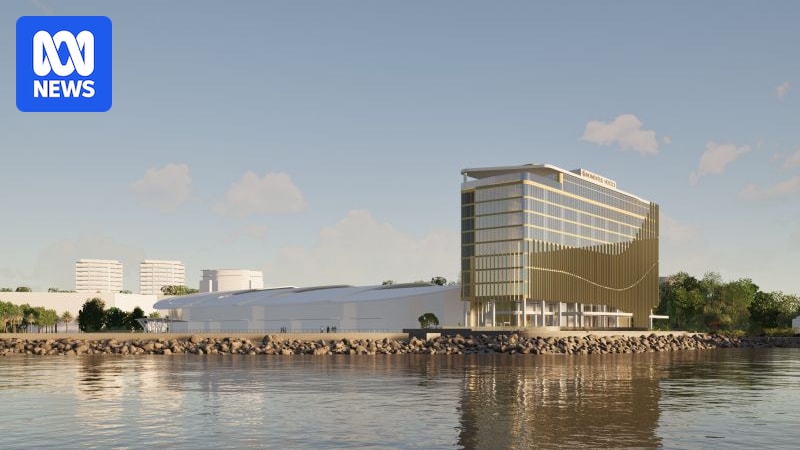
The Northern Territory government and a Singapore-backed developer have navigated a significant hurdle in their plans to build a high-rise hotel at the Darwin Waterfront. This development comes after the Aboriginal Areas Protection Authority (AAPA) controversially amended a decades-old certificate, a move criticized by some as “legislative vandalism.”
Announced in May last year, the proposed hotel at Stokes Hill on Darwin Harbour is touted as a major economic boost for the region, promising jobs, increased tourism, and upscale accommodation. However, the project encountered strong opposition from traditional owners and faced scrutiny over the transparency of the government’s agreement with the developer, SH Darwin.
Concerns Over Sacred Sites and Legislative Changes
The Larrakia elders have voiced their concerns, stating that the hotel would be situated directly opposite a sacred site. At a proposed height of 47 meters, they argue it would disrupt the Dreamtime story associated with the site. In response to these concerns, the NT government amended the Sacred Sites Act in May to “streamline” the laws, reducing bureaucratic hurdles.
While the government insists these changes were necessary, AAPA board members and traditional owners have criticized the amendments as rushed and potentially detrimental to the protection of sacred sites. Labor MLA Chansey Paech went as far as to claim that the bill was designed specifically to facilitate the Waterfront hotel project.
Amendments and Their Implications
On Thursday, AAPA announced that SH Darwin and the Darwin Waterfront Corporation had been added to the existing authority certificate, originally issued to the NT government in 2004. This marks one of the first applications of the new law, which allows additional parties to be added to an existing certificate without further consultation with traditional owners.
AAPA chair Bobby Nunggumajbarr expressed “very serious concerns” about utilizing a 20-year-old certificate to advance the hotel project. He noted that the original certificate did not account for a high-rise hotel near the convention center or adjacent to the registered sacred site.
“More recent certificates for development around Stokes Hill, including for the Larrakia Cultural Centre, set strict height limits to protect the sacred site,” he said. “Larrakia custodians have been very clear that the current SH Darwin Hotel design will impact the site.”
Resignations and Reactions
In a dramatic turn, AAPA board member Rachel Perkins resigned immediately over the issue, citing her decision as one made on principle. She expressed her dismay at the board’s predicament, stating, “AAPA is being manipulated, and the existing authority certificate is being manipulated, and it goes against honest principles of doing business.”
Meanwhile, AAPA has pledged to write to federal Indigenous Australians Minister Malarndirri McCarthy and Environment and Water Minister Murray Watt to support the Larrakia custodians’ objections to the hotel development.
Government’s Stance and Future Steps
In a letter obtained by the ABC, Treasurer Bill Yan informed Larrakia stakeholders of the NT government’s intentions to proceed with the hotel project, leveraging the recent amendments to the Sacred Sites Act. The letter emphasized that all recorded parties would be required to comply fully with the conditions under the 2004 certificate.
Former chief executive of the Larrakia Development Corporation, Nigel Browne, criticized the government’s amendments as a “backdoor way” to bypass sacred site protections for financial gain. He warned, “What this government is signalling now to the rest of the territory is that if your sacred sites or sites of significance are in the way of private dollars, you lose out.”
In contrast, Tourism and Hospitality Minister Marie-Clare Boothby welcomed the announcement, arguing that the changes to the Sacred Sites Act were overdue. She stated that the amendments would “restore certainty for pastoralists and industry, while also strengthening protections for sacred sites.”
“The change also reduces unnecessary duplication and guarantees that any conditions protecting sacred sites apply equally to new parties,” Boothby added.
As the debate continues, the future of the Darwin Waterfront hotel project remains uncertain, with traditional owners and government officials at odds over the balance between development and cultural preservation. The next steps will likely involve further legal and political negotiations, as stakeholders seek a resolution that respects both economic ambitions and cultural heritage.







